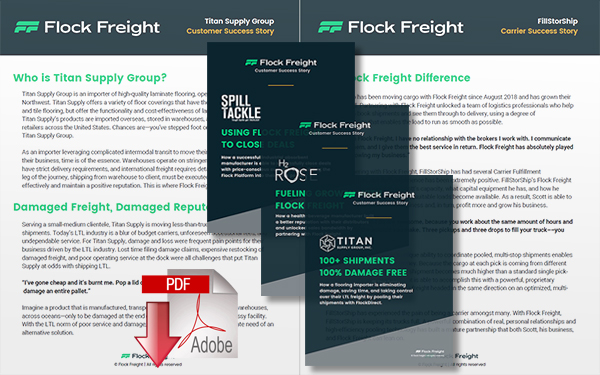How the Coronavirus is Impacting the Trucking Industry

The Dow Jones Industrial Average dropped over 1,000 points last Monday, and freight share values fell drastically, only time will tell how the coronavirus outbreak will impact the trucking industry and the worldwide population.
The Coronavirus
The stock market plummeted last Monday afternoon, and all signs point to coronavirus as the cause.
Since the virus flared up on December 31, 2019, it’s killed nearly 2,800 of the more than 80,000 people it’s afflicted.
Now, the world is taking measures to fight the bug, prevent its spread, and save the global economy.
According to the World Health Organization (WHO), coronaviruses are a family of viruses that can lead to a variety of respiratory illnesses, including the common cold, Middle East Respiratory Syndrome (MERS) and Severe Acute Respiratory Syndrome (SARS).
The strain that’s currently jeopardizing public health (COVID-19) originated in mainland China, where it’s killed over 2,700 people. It was first transmitted from animals to humans in Wuhan (the capital of China’s Hubei province and a major city of commerce) and has since spread all over the globe.
The countries with confirmed cases of coronavirus have set up mandatory quarantines for the sick and include South Korea, Japan, the Philippines, Italy, and Iran. Health officials have confirmed all instances are connected to the first case.
Not only is coronavirus threatening public health, but it’s also crippling the Chinese economy and supply chains around the world.
The Chinese government has accounted for 78,000 cases, established mass quarantines throughout the country (with more than 20 of them in Wuhan alone), and closed companies and schools. This nationwide lockdown has disrupted business operations and created a range of challenges for freight companies, from restricted port access to roadblocks.
Chinese Freight Workers
Chinese freight workers haven’t been able to send unloaded shipments to their final destinations, and loads have started to accumulate at drop-off locations. Even if trucking routes were accessible, few drivers are available to transport loads. (A large percentage of them live in heavily impacted Hubei and nearby provinces.)
According to JOC, trucking activities in central China are only operating around 20-40%, with critical conditions facing the Zhejiang Province, particularly Ningbo. This region is almost entirely shut down, and only 10-20% of its trucks are in use. However, the same piece notes “…capacity is much better in north China with around 70-80% availability…”
China has the second-largest economy on earth and a global supply force. Because its business ties span the planet, the productivity decrease has triggered negative economic repercussions across the world. Investors have responded in turn and tightened their purse strings, which caused big dips in stock markets this week.
The Dow Jones Industrial Average dropped over 1,000 points last Monday, and freight share values fell drastically. Airlines have been hit especially hard, calculating billions in lost earnings. Ocean carriers aren’t faring much better; many are experiencing sharp declines in revenue.
Companies all over the globe are bracing for reductions in output and adjusting their expectations for Q1. According to Forbes, China’s slowdown “…could cause gaps in worldwide availability of many raw materials, intermediate goods, and finished products.” Impacted Chinese exports include oil, gas, copper, and manufactured products (like technology, auto parts, and retail goods).
News: Amazon tells its giant network of truck drivers to stay home if feeling sick
The United States imports most of the goods it consumes. FreightWaves notes “Chinese imports accounted for roughly 40% of the shipments entering the U.S. in the last month”, and 7% of sea shipments from China to the West Coast (of the U.S.) had been canceled as a result of coronavirus.
The longer China’s downturn lasts, the more it will hurt manufacturers. Vining Sparks cites car companies - common customers of U.S. freight companies - as examples. Its Portfolio Management Group division writes, “Hyundai and Renault have already announced plant closures due to supply issues from [mainland] China. Fiat Chrysler has warned…it might need to halt some production in Europe due to supply chain issues.” If the slump persists, not only will freight companies have fewer products to transport, but manufacturers will run out of goods to sell.
Arkansas Trucking Association
Shannon Newton, President of the Arkansas Trucking Association elaborated on the situation: “With the virus still not contained and potential treatments or vaccines unknown, it is hard to predict the peak or ultimate impact on the world’s economy. But given that trucking is the primary mode of transportation for all consumer goods, and the majority of consumer goods are sourced at some point from China or other Asian countries, the impact, while temporary, is potentially substantial.” Only time will tell how the coronavirus outbreak will impact the trucking industry and the worldwide population.
In the meantime, authorities are paying close attention to new developments. While the WHO hasn’t declared coronavirus a pandemic, drug companies are working together to produce a cure, health institutes are organizing clinical trials to test antivirus drugs on coronavirus cases, and governments are preparing emergency plans and educating the public on the disease.
The Centers for Disease Control and Prevention
The Centers for Disease Control and Prevention (CDC) warns coming into close contact with an infected person puts people at risk of infection, especially if the infected person sneezes or otherwise releases germs into the air. Early symptoms are similar to those of the common cold and include cough, runny nose, sore throat, and nasal congestion.
However, if they worsen to fever, shortness of breath and aches and pains, the immune system may be compromised. At this point, healthcare providers recommend seeing a doctor. For more information, visit the CDC’s coronavirus web portal.
CDC Coronavirus Resources:
- COVID-19 Resource Page
- Information for Travelers
- Key Facts about COVID-19
- Community Preparation Tips
- CDC Preparation Flowchart
Source: Flock Freight Blog
Related Article: Is Your Global Supply Chain Prepared for the Coronavirus?
Related Resources
Supply Chain Lessons Learned from The Coronavirus and SARS Outbreaks
This white paper contains insights from recent interviews with leading organizations on how they are responding to the new coronavirus crisis. Download Now!
Flock Freight: 3 Customer Success Stories
See how these three industry leaders, H2rOse, Spill Tackle, and Titan Supply Group, are using Flock Freight to streamline their supply chains. Download Now!
More Resources from Flock Freight
Article Topics
Flock Freight News & Resources
Wasted Space and Damaged Freight Overshadowed Favorable Conditions for Businesses in 2022 Top Issues Affecting Shippers Last Year 6 Lessons from CSCMP EDGE 2022 to Improve Shipping Freight & Supply Chain Inefficiencies Inefficiency - Not Just the Labor Shortage - Is Breaking Supply Chains Today’s Post-Pandemic Parcel Delivery Marketplace A Shipper’s Guide to Navigating Post-Pandemic 2022 Holiday Freight Shared Truckload Freight Increases Carrier Revenue by 20% More Flock FreightLatest in Supply Chain
A Look at Baltimore’s Key Bridge Collapse—One Month Later European Parliament Passes New Law Requiring Supply Chain Accountability Baltimore Continues Bridge Recovery With Opening of New Channel How Shippers Can Prep for Hurricane Season Apple Accused of Multiple Human Rights Violations South Korea Finally Overtakes China in Goods Exported to U.S. UPS Struggles in First Quarter With Steep Earnings Decline More Supply Chain

















